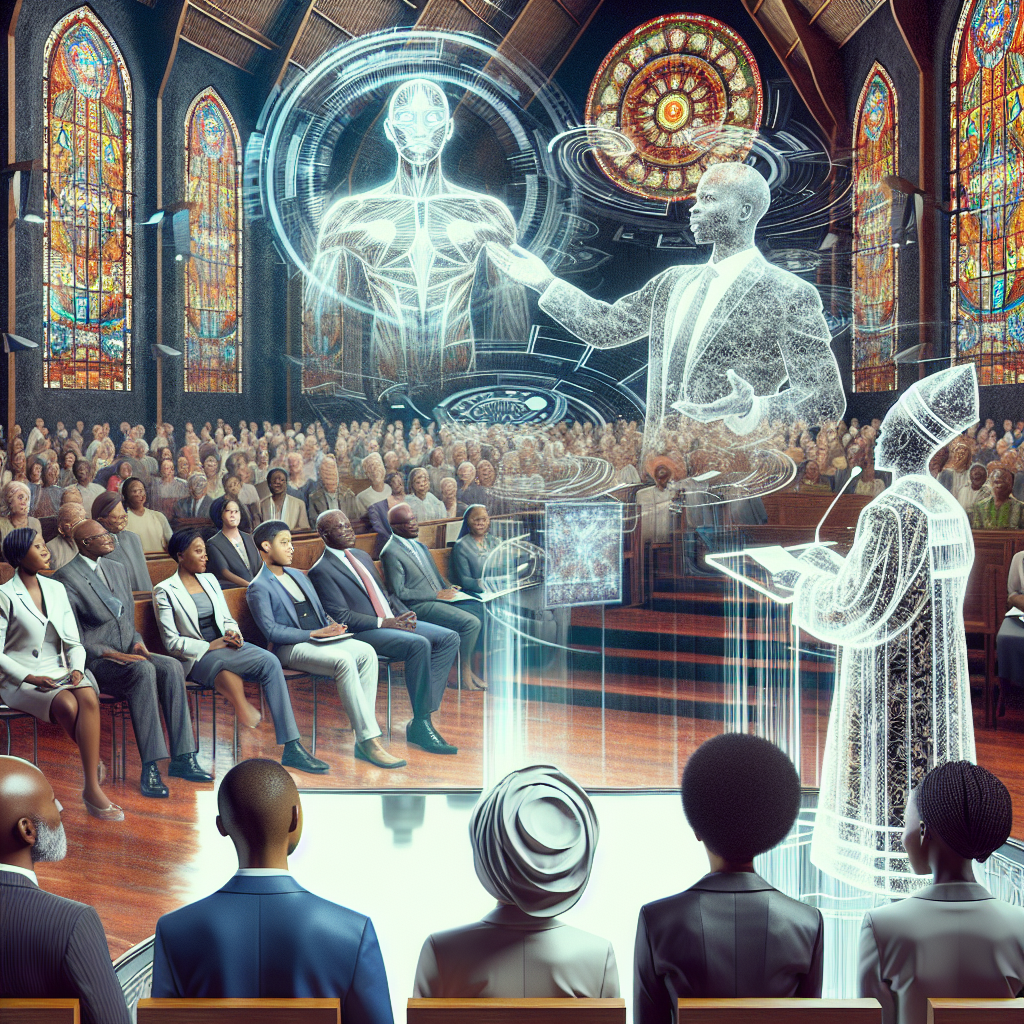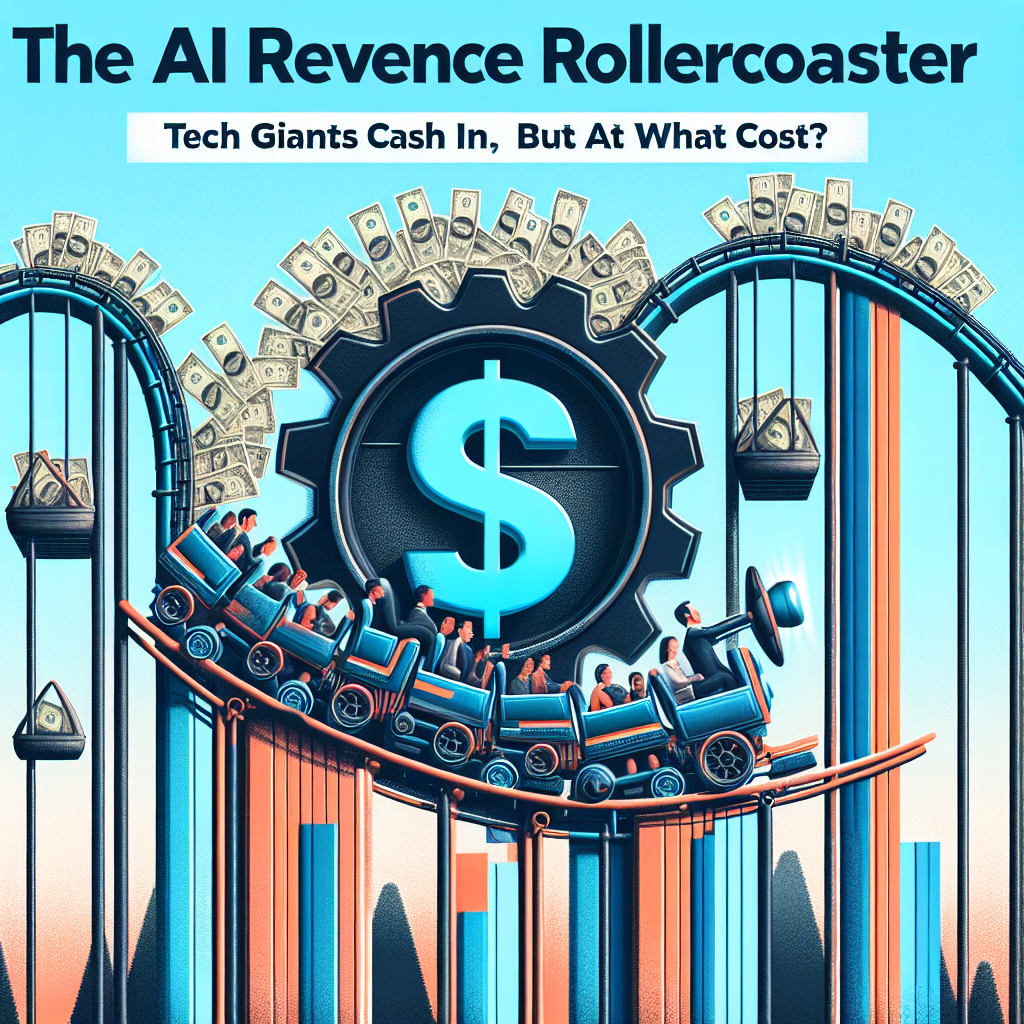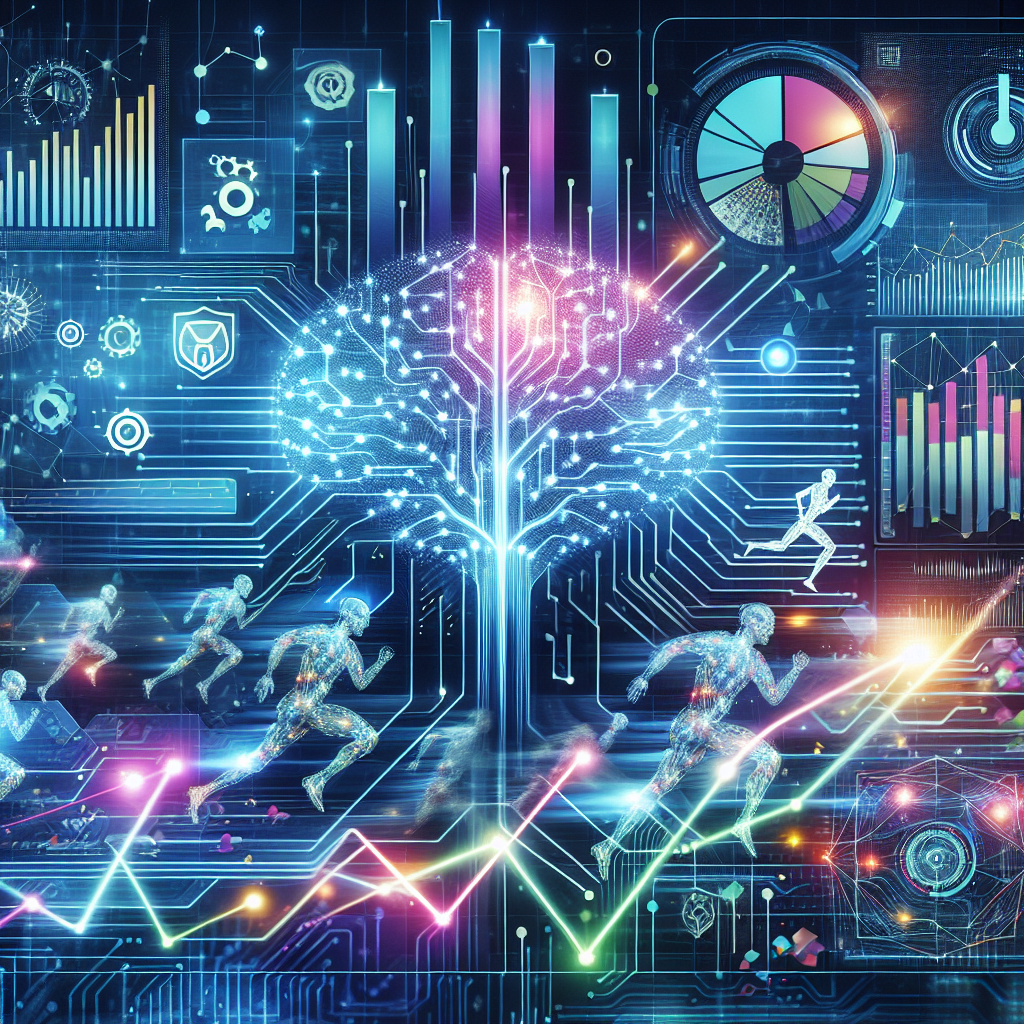Unveiling the Future: How Artificial Intelligence is Transforming the African Church
Artificial intelligence (AI) has emerged as one of the most transformative technologies of the 21st century, revolutionizing industries and reshaping societies across the globe. While its potential benefits are widely acknowledged, the implications of AI on various aspects of life, including religion, are still being explored. In this article, we delve into the specific implications of AI on the African Church, examining the opportunities and challenges it presents for the spiritual community.
The African Church, with its rich history and diverse traditions, has always been at the forefront of embracing technological advancements to enhance its outreach and impact. However, as AI continues to advance at an unprecedented pace, it raises thought-provoking questions about the future of the African Church and its role in a world increasingly influenced by machines. This article will explore how AI is being integrated into religious practices, the ethical considerations surrounding its use, and the potential impact on the African Church’s theology, community dynamics, and mission. Additionally, we will discuss the challenges that AI poses to traditional religious practices and the steps that the African Church can take to navigate this rapidly evolving landscape while preserving its core values and relevance.
Key Takeaways:
1. The African Church needs to embrace and adapt to the implications of artificial intelligence (AI) in order to stay relevant and effectively serve its congregation.
2. AI has the potential to enhance various aspects of the African Church, such as outreach, communication, and administration, by providing innovative tools and solutions.
3. While AI can automate certain tasks and processes, it cannot replace the human element of spirituality and community that the African Church offers. It should be used as a complementary tool rather than a substitute for personal interaction and connection.
4. The ethical implications of AI in the African Church need to be carefully considered, such as maintaining privacy and data security, ensuring unbiased algorithms, and addressing concerns of job displacement.
5. The African Church has an opportunity to leverage AI for social impact, such as using data analytics to identify and address social issues, promoting inclusivity and diversity, and empowering marginalized communities.
Insight 1: Enhancing Communication and Outreach
Artificial Intelligence (AI) has the potential to revolutionize the way the African Church communicates and reaches out to its members and the wider community. With the rapid advancement of technology, AI-powered chatbots and virtual assistants can be utilized to provide instant and personalized responses to inquiries, prayer requests, and counseling needs. These AI systems can be programmed to understand different languages and dialects, making it easier for the Church to connect with people from diverse backgrounds and regions.
Additionally, AI can assist in automating routine administrative tasks, freeing up valuable time for church leaders and staff to focus on more impactful activities. For example, AI-powered systems can handle event registrations, manage membership databases, and even generate personalized newsletters or sermons based on individual preferences and interests. This level of automation can streamline operations and enable the Church to engage with its members more efficiently.
Insight 2: Enriching Worship Experience and Spiritual Growth
AI can play a significant role in enhancing the worship experience and spiritual growth of the African Church. Virtual reality (VR) and augmented reality (AR) technologies can create immersive environments for worship, allowing individuals to feel as if they are physically present in the church, even if they are unable to attend in person. This can be especially beneficial for those who are physically disabled, elderly, or living in remote areas with limited access to churches.
Furthermore, AI-powered recommendation systems can personalize worship experiences by suggesting relevant songs, Bible verses, and sermons based on an individual’s preferences and spiritual needs. These systems can analyze a person’s previous engagement with church content, their feedback, and their current spiritual journey to provide tailored recommendations that resonate with their unique circumstances. This personalized approach can deepen the spiritual connection between individuals and their faith, fostering a stronger sense of belonging and growth within the African Church.
Insight 3: Addressing Ethical and Theological Challenges
While the adoption of AI in the African Church brings numerous benefits, it also raises ethical and theological challenges that need to be addressed. One of the key concerns is the potential loss of human connection and the risk of replacing genuine pastoral care with automated systems. The Church must ensure that AI technologies are used as tools to enhance human interactions, rather than as substitutes for personal relationships and spiritual guidance.
Additionally, there is a need for theological reflection on the implications of AI in the context of the African Church. Theological discussions should explore questions such as the nature of the soul in relation to AI, the ethical use of data collected by AI systems, and the impact of AI on the understanding of divine intervention and miracles. It is crucial for the African Church to engage in these conversations to ensure that AI is integrated in a way that aligns with its core values and theological foundations.
Furthermore, the African Church should prioritize inclusivity and accessibility when implementing AI technologies. It is essential to consider the digital divide and ensure that AI-powered solutions do not exclude those who do not have access to the necessary devices or internet connectivity. The Church should strive to bridge the gap and make AI-driven advancements available to all members, regardless of their socioeconomic status or geographical location.
The Role of Artificial Intelligence in the African Church
Artificial intelligence (AI) is revolutionizing various industries worldwide, and the African Church is not exempt from its impact. As AI continues to advance, it presents both opportunities and challenges for the African Church. This section explores the role of AI within the African Church, highlighting its potential benefits and drawbacks.
Enhancing Accessibility and Outreach through AI
One of the significant implications of AI on the African Church is the potential to enhance accessibility and outreach. AI-powered chatbots and virtual assistants can provide instant responses to inquiries, offer counseling services, and even assist in sermon preparation. These technologies can help the African Church reach a wider audience, especially in remote areas where access to physical church buildings may be limited.
AI-Powered Pastoral Care and Counseling
AI has the potential to transform pastoral care and counseling within the African Church. Chatbots and virtual assistants can provide personalized support, offering guidance and advice on various issues. They can also analyze data to identify patterns and trends in individuals’ spiritual well-being, enabling pastors to provide targeted support. However, it is important to strike a balance between AI-powered support and the personal touch that comes with face-to-face interactions.
Implications for Traditional Worship Practices
The of AI in the African Church raises questions about its impact on traditional worship practices. Some churches have started using AI-powered worship leaders, who can sing, play instruments, and even deliver sermons. While these technologies can enhance the worship experience, they also raise concerns about the authenticity and spiritual depth of such practices. It is crucial for the African Church to carefully navigate these implications and ensure that technology complements, rather than replaces, traditional worship practices.
AI and the Preservation of African Culture
AI can play a role in preserving African culture within the context of the Church. Language translation tools powered by AI can help bridge communication gaps between different African languages, allowing for a more inclusive worship experience. Additionally, AI-powered platforms can digitize and preserve traditional African hymns, prayers, and rituals, ensuring they are passed down to future generations. However, it is essential to approach this use of AI with cultural sensitivity and respect for the diversity of African traditions.
Ethical Considerations and the African Church
As AI becomes more prevalent in the African Church, ethical considerations arise. It is crucial for the African Church to navigate these challenges with caution. Issues such as data privacy, bias in AI algorithms, and the potential for AI to replace human interactions must be carefully addressed. The African Church should actively engage in discussions surrounding AI ethics, ensuring that the technology is used in ways that align with its core values and principles.
Preparing African Church Leaders for the AI Era
The advent of AI necessitates the preparation of African Church leaders for the challenges and opportunities it presents. Church leaders need to be equipped with the knowledge and skills to understand and utilize AI effectively. Training programs and workshops can be developed to educate pastors and church administrators on the implications of AI, enabling them to make informed decisions regarding its implementation within their respective congregations.
Collaboration between the African Church and AI Developers
In order to fully harness the potential of AI, collaboration between the African Church and AI developers is essential. By working together, the African Church can provide valuable insights and perspectives, ensuring that AI technologies are developed with the specific needs and cultural context of African congregations in mind. This collaboration can lead to the creation of AI solutions that truly serve the African Church and contribute to its growth and impact.
Addressing the Digital Divide within the African Church
While AI holds great promise for the African Church, it is important to address the digital divide that exists within the continent. Access to technology and the internet remains limited in many areas, hindering the widespread adoption of AI-powered solutions. Efforts should be made to bridge this divide, ensuring that all African churches have equal opportunities to benefit from AI technologies and the opportunities they present.
Embracing AI while Preserving the Essence of Faith
As the African Church embraces AI, it is vital to remember the essence of faith. While AI can enhance various aspects of church life, it should never replace the core values and principles that underpin the African Church. The integration of AI should be done in a way that preserves the authenticity, spirituality, and community-centered nature of the African Church, ensuring that technology remains a tool to support and enhance, rather than overshadow, the faith experience.
The Historical Context of ‘The Implications of Artificial Intelligence on the African Church’
Artificial Intelligence (AI) is a concept that has been around since the 1950s, but its implications on the African Church have only recently become a topic of discussion. To understand the current state of this issue, it is essential to examine its historical context and how it has evolved over time.
Early Perceptions and Challenges
In the early days of AI, the African Church did not pay much attention to the technology. The focus was primarily on traditional forms of worship and spreading the gospel. However, as AI started gaining prominence globally, the African Church began to face new challenges.
One of the initial challenges was the perception that AI was a threat to human spirituality. Some believed that the reliance on machines for tasks traditionally performed by humans could undermine the importance of faith and divine intervention. Others feared that AI could lead to a loss of jobs within the church community, causing economic and social instability.
Adoption and Integration
As technology advanced and AI became more prevalent in various sectors, the African Church started to recognize the potential benefits it could offer. The adoption and integration of AI became a topic of interest, with discussions surrounding its use for administrative tasks, data analysis, and outreach efforts.
Some churches began utilizing AI-powered tools to streamline their operations. For example, chatbots were implemented to provide instant responses to common queries, freeing up human resources for more complex tasks. Additionally, AI algorithms were used to analyze large datasets, enabling churches to gain insights into their congregation’s needs and preferences.
Ethical Considerations and Cultural Sensitivities
As the African Church explored the possibilities of AI, ethical considerations and cultural sensitivities emerged as important factors to address. The use of AI in decision-making processes raised questions about accountability and transparency. The African Church emphasized the need for human oversight to ensure that AI systems aligned with religious values and principles.
Furthermore, cultural sensitivities played a significant role in shaping the African Church’s approach to AI. The technology’s potential to perpetuate biases or overlook cultural nuances raised concerns. The African Church stressed the importance of developing AI systems that respected and accommodated diverse cultural practices and beliefs.
Empowering Outreach and Engagement
Over time, the African Church recognized the potential of AI to empower outreach and engagement efforts. AI-powered translation tools, for instance, facilitated communication between missionaries and local communities, overcoming language barriers. Virtual reality and augmented reality technologies were also utilized to create immersive religious experiences, enabling individuals to engage with the church remotely.
The African Church embraced AI as a tool for expanding its reach and connecting with a broader audience. Social media platforms and AI algorithms were leveraged to personalize content and tailor messages to specific demographics, enhancing the effectiveness of evangelism and discipleship.
Current State and Future Outlook
Today, the African Church finds itself at the intersection of tradition and technological advancement. The historical context of AI’s implications on the African Church demonstrates a shift in perception from skepticism to cautious adoption. The focus has evolved from viewing AI as a threat to exploring its potential for enhancing church operations, outreach, and engagement.
Looking ahead, the African Church continues to grapple with the challenges and opportunities presented by AI. Ethical considerations, cultural sensitivities, and the need for human oversight remain critical. As technology continues to advance, the African Church must adapt and find ways to leverage AI responsibly while staying true to its core values and mission.
Case Study 1: AI-powered Pastoral Care
In Nigeria, the Redeemed Christian Church of God (RCCG) has embraced the use of artificial intelligence to enhance their pastoral care services. With a congregation of over 5 million people, it became increasingly challenging for the church to provide personalized attention to every member.
By leveraging AI technology, the RCCG developed a chatbot named “Pastor AI” that is accessible through their website and mobile app. This chatbot is designed to provide spiritual guidance, answer common questions, and offer prayer support to church members. It uses natural language processing algorithms to understand and respond to user queries effectively.
Since its implementation, Pastor AI has become a valuable resource for the RCCG community. It is available 24/7, allowing members to seek guidance and support at any time. The chatbot’s ability to provide personalized responses based on individual needs has helped strengthen the bond between the church and its members, even in the absence of physical interaction.
Case Study 2: AI-assisted Bible Translation
In Ethiopia, the Ethiopian Orthodox Tewahedo Church (EOTC) has been leveraging AI technology to expedite the process of Bible translation. The EOTC recognized the need to make the Bible accessible to a wider audience, including those who speak regional languages and dialects.
Traditionally, Bible translation is a time-consuming process that requires extensive linguistic expertise. However, with the help of AI, the EOTC developed a machine learning model that can automatically translate biblical texts into various regional languages.
This AI-powered translation system has significantly accelerated the translation process, allowing the EOTC to reach more communities with the Word of God. It has also reduced the reliance on human translators, making Bible translation more cost-effective and efficient.
Case Study 3: AI-driven Sermon Recommendations
In South Africa, the Rhema Bible Church has harnessed the power of AI to enhance the sermon experience for its members. Recognizing that different individuals have unique spiritual needs and preferences, the church sought to provide personalized sermon recommendations.
By analyzing the sermon transcripts and member feedback, the Rhema Bible Church developed an AI algorithm that can predict the topics and styles of sermons that resonate with specific individuals. This algorithm takes into account factors such as previous sermon engagement, personal interests, and demographic information.
With the implementation of this AI-driven recommendation system, members of the Rhema Bible Church can now receive sermon suggestions tailored to their preferences. This not only enhances their spiritual growth but also fosters a sense of belonging within the church community.
These case studies highlight the positive impact of artificial intelligence on the African church. From AI-powered pastoral care to AI-assisted Bible translation and AI-driven sermon recommendations, technology has enabled churches to overcome various challenges and better serve their congregations. While there are concerns about the potential loss of human touch, these examples demonstrate how AI can be a valuable tool in expanding the reach and impact of the church in Africa.
The Role of Artificial Intelligence in the African Church
Artificial Intelligence (AI) has emerged as a transformative technology across various industries, and its potential impact on the African Church is no exception. As AI continues to advance, it presents both opportunities and challenges for the church in Africa, affecting various aspects such as worship, community engagement, and pastoral care.
Enhanced Worship Experience
AI can enhance the worship experience in the African Church by providing new tools and resources. One such example is AI-powered virtual reality (VR) and augmented reality (AR) applications. These technologies can transport churchgoers to biblical times, allowing them to experience the stories and teachings in a more immersive way. Additionally, AI can analyze individual preferences and create personalized worship experiences, tailoring music, sermons, and prayers to the specific needs of each worshipper.
Efficient Pastoral Care
Pastoral care plays a crucial role in the African Church, and AI can help optimize its delivery. Natural Language Processing (NLP) algorithms can analyze large volumes of text, such as biblical texts, sermons, and counseling sessions, to extract insights and identify patterns. This can assist pastors in providing more accurate and personalized guidance to their congregants. AI-powered chatbots can also be deployed to offer immediate support and prayer to church members, especially in situations where pastors may not be readily available.
Community Engagement and Outreach
AI can facilitate community engagement and outreach efforts in the African Church. Social media platforms, equipped with AI algorithms, can help identify individuals who may be seeking spiritual guidance or are interested in joining a church community. By analyzing user behavior and preferences, AI can target specific demographics with tailored content, invitations to events, and relevant resources. AI-powered translation tools can also break down language barriers, enabling the church to reach a wider audience across different African countries.
Ethical Considerations and Challenges
While AI brings numerous benefits, it also raises ethical considerations and challenges for the African Church. One key concern is the potential for AI to replace human interaction and pastoral care. While AI can provide support and resources, it should not replace the vital role of human pastors in providing empathy, understanding, and spiritual guidance. The church must strike a balance between leveraging AI for efficiency and maintaining the personal touch that is essential for pastoral care.
Another challenge is the potential bias in AI algorithms. If not carefully designed and trained, AI systems can perpetuate existing biases and inequalities. The African Church needs to ensure that AI technologies are developed with diverse perspectives and that they are regularly audited to identify and address any biases that may arise.
As AI continues to advance, its implications on the African Church are significant. By leveraging AI technologies, the church can enhance worship experiences, optimize pastoral care, and engage with communities in new and meaningful ways. However, it is crucial for the church to navigate the ethical considerations and challenges that arise with AI adoption, ensuring that human interaction and the core values of empathy and spirituality remain at the forefront.
FAQs about the Implications of Artificial Intelligence on the African Church
1. What is artificial intelligence (AI) and how does it relate to the African Church?
Artificial intelligence refers to the development of computer systems that can perform tasks that usually require human intelligence. In the context of the African Church, AI has the potential to impact various aspects, such as church administration, pastoral care, evangelism, and worship.
2. How can AI enhance church administration in Africa?
AI can streamline administrative tasks in the African Church, such as managing membership databases, automating financial processes, and organizing events. This can free up valuable time for church leaders and staff to focus on more meaningful activities.
3. Is there a risk of AI replacing human pastors in the African Church?
No, AI cannot replace the role of human pastors in the African Church. While AI can assist with certain tasks, pastoral care requires human connection, empathy, and spiritual guidance that AI cannot replicate.
4. Can AI be used for evangelism in the African Church?
Absolutely. AI can be utilized to reach a wider audience through digital platforms, chatbots, and personalized content. It can also help analyze data to identify potential areas for evangelistic outreach and engage with individuals seeking spiritual guidance.
5. What are the potential ethical concerns regarding AI in the African Church?
One concern is the ethical use of data collected through AI systems. Churches must ensure that personal information is handled securely and with respect for privacy. Additionally, there may be ethical considerations around the use of AI in decision-making processes within the church.
6. How can the African Church ensure that AI aligns with its values and teachings?
The African Church should actively engage with AI developers and experts to ensure that AI systems are designed in line with its values and teachings. This can involve establishing guidelines, ethical frameworks, and partnerships with organizations that share similar values.
7. Can AI enhance worship experiences in the African Church?
AI has the potential to enhance worship experiences in the African Church by providing tools for multimedia presentations, facilitating real-time translations, and offering personalized worship recommendations based on individual preferences.
8. What are the potential challenges in adopting AI in the African Church?
One challenge is the lack of technological infrastructure in some regions of Africa. Limited internet access and unreliable power supply can hinder the adoption of AI systems. Additionally, there may be resistance to change among church members who are unfamiliar with AI technology.
9. How can the African Church address the digital divide when implementing AI?
The African Church can address the digital divide by partnering with organizations that provide technological support and training. This can involve initiatives to improve internet connectivity, provide access to affordable devices, and offer digital literacy programs.
10. What role should the African Church play in shaping the future of AI in Africa?
The African Church should actively participate in discussions and policy-making processes regarding AI in Africa. By engaging with experts, policymakers, and other stakeholders, the church can ensure that AI technologies are developed and implemented in a way that serves the best interests of the African people and aligns with the church’s mission.
Concept 1: Artificial Intelligence (AI)
Artificial Intelligence (AI) refers to the ability of machines or computer systems to perform tasks that would typically require human intelligence. This includes tasks like learning, problem-solving, decision-making, and understanding natural language. AI systems are designed to analyze vast amounts of data, identify patterns, and make predictions or recommendations based on that data.
In the context of the African Church, AI can have significant implications. It can be used to improve the efficiency and effectiveness of various church activities, such as managing administrative tasks, organizing events, and providing personalized spiritual guidance. AI can also enhance communication with church members, facilitate online worship experiences, and help in spreading the message of the Gospel to a wider audience.
Concept 2: Ethical Considerations
When discussing the implications of AI on the African Church, it is crucial to consider the ethical aspects. AI systems are created and programmed by humans, and they can inherit biases, prejudices, and limitations from their creators. This means that AI can inadvertently perpetuate existing societal inequalities or reinforce certain belief systems.
For the African Church, it is essential to ensure that AI technologies are aligned with their core values and principles. This includes addressing issues of fairness, transparency, accountability, and privacy. The Church should actively participate in the development and deployment of AI systems, advocating for ethical guidelines and regulations that promote inclusivity, social justice, and respect for human dignity.
Concept 3: Human-AI Collaboration
Another important concept to consider is the idea of human-AI collaboration. While AI can automate certain tasks and processes, it should not replace human involvement in the African Church. The human touch, empathy, and spiritual guidance provided by pastors, priests, and church leaders are irreplaceable.
AI can be seen as a tool to enhance and support the work of the Church, rather than a substitute for human interaction. For example, AI-powered chatbots can assist in answering basic questions or providing initial guidance, but they cannot replace the role of a spiritual counselor who can offer personalized advice and emotional support.
It is crucial for the African Church to strike a balance between leveraging the benefits of AI and preserving the human connection and spiritual guidance that are at the core of its mission. This means using AI technologies as a complement to human efforts, ensuring that they serve the greater good and contribute to the overall well-being of church members.
1. Embrace the potential of AI in your church
Recognize the transformative power of AI and its potential to enhance various aspects of church life. Be open to exploring how AI can be integrated into your worship services, community outreach, and administrative tasks.
2. Stay informed about AI developments
Stay updated on the latest AI technologies and applications relevant to the church. Regularly read articles, attend conferences, and engage in discussions to understand the possibilities and limitations of AI in a church context.
3. Identify specific areas where AI can be beneficial
Assess your church’s needs and identify specific areas where AI can be applied to improve efficiency and effectiveness. This could include automating administrative tasks, enhancing communication with congregants, or creating personalized worship experiences.
4. Start small and experiment
Don’t feel overwhelmed by the complexity of AI. Start small by experimenting with simple AI tools or applications. This could involve using chatbots for basic inquiries, implementing AI-powered data analytics, or exploring AI-driven sermon preparation tools.
5. Involve the congregation in AI initiatives
Engage your congregation in discussions about AI and its potential impact on the church. Encourage them to share their ideas, concerns, and expectations. By involving the congregation, you can ensure that AI initiatives align with their needs and values.
6. Foster ethical AI practices
As you adopt AI technologies, prioritize ethical considerations. Ensure that AI systems are designed to respect privacy, promote fairness, and avoid bias. Be transparent about how AI is being used and address any concerns or misconceptions that may arise.
7. Provide training and support
Equip your church leaders and staff with the necessary knowledge and skills to effectively use AI technologies. Offer training sessions, workshops, or online resources to help them understand AI concepts and make the most of AI tools.
8. Collaborate with AI experts
Seek partnerships with AI experts or organizations that can provide guidance and support. Collaborating with professionals in the field can help you navigate the complexities of AI implementation and ensure that you make informed decisions.
9. Evaluate and adapt
Regularly evaluate the impact of AI initiatives in your church. Monitor the effectiveness, efficiency, and user experience of AI systems and make adjustments as needed. Continuously seek feedback from congregants to improve and refine your AI applications.
10. Embrace the human touch
While AI can enhance certain aspects of church life, remember that it is not a substitute for human connection and spiritual guidance. Embrace the human touch in your interactions with congregants and ensure that AI technologies serve as tools to support and enhance, rather than replace, the unique experiences of worship and community.
In conclusion, the implications of artificial intelligence on the African Church are vast and multifaceted. Firstly, AI has the potential to enhance the efficiency and effectiveness of church operations, from administrative tasks to pastoral care. With AI-powered tools, churches can automate processes, analyze data, and provide personalized services to their members. This can lead to improved resource management and better engagement with congregants. However, it is crucial for the African Church to approach AI with caution and careful consideration. The ethical and moral implications of AI should be thoroughly examined, ensuring that the technology aligns with the values and teachings of the Church. Additionally, efforts should be made to bridge the digital divide and ensure that AI is accessible to all members of the African Church, regardless of their socioeconomic background.
Furthermore, while AI presents opportunities, it also poses challenges to the African Church. The potential loss of human connection and the risk of replacing human spiritual leaders with AI-powered chatbots or virtual assistants raise concerns about the authenticity and depth of religious experiences. The African Church must strike a balance between utilizing AI technology and preserving the essence of its spiritual practices. It should harness AI as a tool to support and enhance human interactions, rather than replacing them. Lastly, the African Church must actively engage in discussions and collaborations with AI developers, policymakers, and ethicists to ensure that the technology is leveraged responsibly and ethically.




